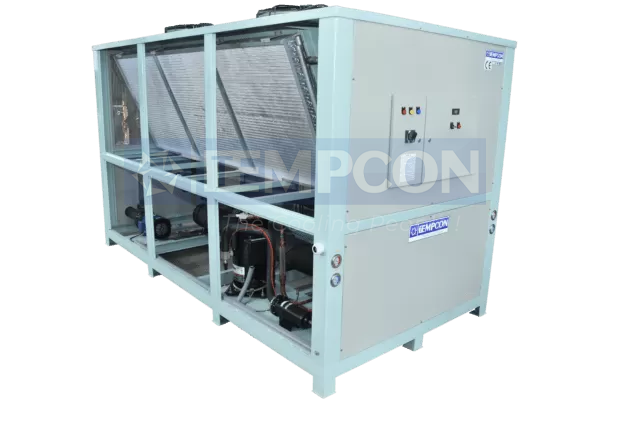Efficient temperature control is the prime factor in industrial operations. An efficient chilling system prevents equipment from overheating.
It also keeps the operators comfortable by negating internal heat gain and reducing the chances of mishaps.
Owners are often confused about which chiller to choose, an HVAC chiller or a process chiller.
Understanding these conventional choices is essential for making an informed decision.



What is a Process Chiller?
A process chiller is a conventional cooling system used to regulate the indoor temperature of an industrial setup. This chiller is designed to remove heat generated by machines and operators. It circulates cooled water to reduce the increasing temperature in the equipment used. Such chillers are used in industries like plastic moulding, laser cutting, chemical processing, etc.
What is an HVAC Chiller?
It is also a cooling machine that integrates heating, cooling, ventilation and air conditioning features. It regulates the indoor temperature of an enclosed space. Commercial and industrial HVAC systems are bigger than domestic ones. Such cooling systems can be used throughout the year in every season.
We now know what these chillers are. Here is a comprehensive guide that explains how they differ on different grounds.
Differences between Process Chiller and HVAC Chiller
You can select the right cooling system by understanding the distinctions between process and HVAC chillers.
Application and Purpose
Process chillers are specifically designed to cool industrial processes and stop machines from overheating. These chillers regulate temperature precisely and meet the specific industrial process requirements.
HVAC chillers focus on controlling the indoor atmosphere by cooling and heating air. Such systems also work as ventilation units for enclosed spaces like offices and factories.
Cooling Circuitry
Process chillers feature independent water and refrigeration circuits. This setup can partially function if one circuit fails.
HVAC chillers are a combined setup of interdependent units. It means if one unit fails, the entire system will stop working.
Integrations and Add-ons
Process chillers have pumps, storage tanks and advanced thermoregulation controls. They also come with a vivid interface for easy temperature control. Such integrations help operators control and change temperature at a very minute level.
HVAC chillers usually require additional integrations for higher requirements and might attract more setup costs.
Precision and Control
Process chillers can control temperature precisely through sensors. It can detect temperature fluctuations and adjust automatically to maintain the required temperature. Hence, these chillers are ideal for sensitive industrial operations.
HVAC chillers maintain a general temperature comfort within an enclosed space. This means its temperature control is within a given range. They are not suitable for precise industrial operational cooling.
How to Choose the Right Chiller?
These are the basic differences between process and HVAC chillers. To select the most suitable option, you need to:
- Process chillers offer industrial cooling whereas HVAC chillers offer space climate control. So, understand your application.
- How precise do you need to control temperature?
These two points will help you make the right decision.
Still confused? Contact Tempcon as your industrial chiller partner to understand the functionalities of different chillers and choose the best option for your industrial setup.



